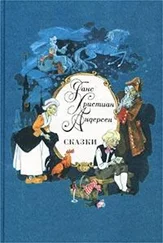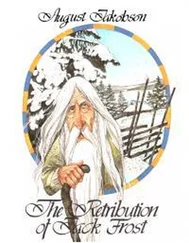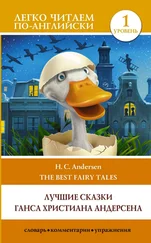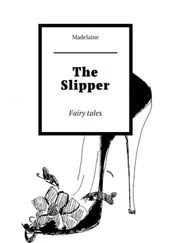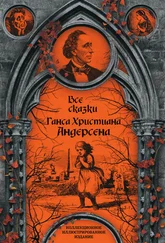Ганс Андерсен - Fairy Tales
Здесь есть возможность читать онлайн «Ганс Андерсен - Fairy Tales» весь текст электронной книги совершенно бесплатно (целиком полную версию без сокращений). В некоторых случаях можно слушать аудио, скачать через торрент в формате fb2 и присутствует краткое содержание. Жанр: Старинная литература, на английском языке. Описание произведения, (предисловие) а так же отзывы посетителей доступны на портале библиотеки ЛибКат.
- Название:Fairy Tales
- Автор:
- Жанр:
- Год:неизвестен
- ISBN:нет данных
- Рейтинг книги:4 / 5. Голосов: 1
-
Избранное:Добавить в избранное
- Отзывы:
-
Ваша оценка:
- 80
- 1
- 2
- 3
- 4
- 5
Fairy Tales: краткое содержание, описание и аннотация
Предлагаем к чтению аннотацию, описание, краткое содержание или предисловие (зависит от того, что написал сам автор книги «Fairy Tales»). Если вы не нашли необходимую информацию о книге — напишите в комментариях, мы постараемся отыскать её.
Fairy Tales — читать онлайн бесплатно полную книгу (весь текст) целиком
Ниже представлен текст книги, разбитый по страницам. Система сохранения места последней прочитанной страницы, позволяет с удобством читать онлайн бесплатно книгу «Fairy Tales», без необходимости каждый раз заново искать на чём Вы остановились. Поставьте закладку, и сможете в любой момент перейти на страницу, на которой закончили чтение.
Интервал:
Закладка:
When she opened her eyes again, she was being lifted and carried. A big, strong fellow had her in his arms. She looked right into his bearded face, and saw that he had a scar over his eye so that it looked like his eyebrow was divided into two parts. He carried her, as miserable as she was, to the ship, where he got angry words from the captain for his actions.
The next day the ship sailed. Marie Grubbe had not come ashore. Indeed, she was taken along. But did she come back? Well, when and where?
The schoolmaster knew about this too, but it was not a story he had put together himself. He knew the whole strange course of events from a credible old book, one that we could take out and read ourselves. The Danish storyteller Ludvig Holberg, 1who has written so many books worth reading and those funny comedies in which we recognize his time and its people, tells about Marie Grubbe in his letters, and about where and how he met her. It’s worth hearing, but we certainly won’t forget Hen-Grethe, who is sitting happy and satisfied in the magnificent henhouse.
The ship sailed off with Marie Grubbe. That’s where we left off.
Years and years passed.
It was 1711, and the plague was raging in Copenhagen. The queen of Denmark went to her home town in Germany. The king left the capital, and everyone who could manage it hurried away from the city. Students, even if they had free room and board, left town. One of them, the last one left in the so-called Borch residence, right by the residence close to the Round Tower, was now leaving too. It was two o’clock in the morning. He had his knapsack with him which had more books and written materials in it than clothing. There was a wet, clammy fog hanging over the city, and not a person was to be seen on the street where he walked. Crosses had been posted on doors and gates round about, which meant that there was plague inside or that the people had died. There weren’t any people to be seen on the wider, curving Kjød-manger street, as it was called, either—the street that goes from the Round Tower down to the King’s castle. Then a big hearse went rumbling by. The driver was cracking his whip, and the horses galloped. The wagon was full of bodies. The young student held his hand to his face and smelled the strong alcohol that he carried on a sponge in a little brass box. From a pub in one of the alleys came raucous singing and cheerless laughter from people who were drinking the night away in order to forget that the plague was at their door and wanted to add them to the hearse with the other dead. The student headed towards the bridge by the castle where there were a couple of small boats. One was just pulling away to escape the infested city.
“If God allows us to live, and we have a good wind, we’re headed to Grønsund by Falster,” said the captain and asked the student, who wanted to go along, for his name.
“Ludvig Holberg,” said the student, and the name sounded like any other name. Now it resounds as one of the proudest names in Denmark, but then he was just a young, unknown student.
The ship sailed past the castle. It wasn’t quite light yet when it came into the open sea. A light breeze blew and the sail swelled. The young student sat with his face to the fresh wind and fell asleep, which wasn’t really advisable.
By the third morning the ship was already lying off Falster.
“Do you know a place I can stay here that’s not too expensive?” Holberg asked the captain.
“I think you could do well with the ferryman’s wife at Borrehuset,” he answered. “If you want to be especially courteous, her name is Mother Søren Sørensen Møller. But she might get angry if you are too high-class with her. Her husband was arrested for some misdeed, so she drives the ferry herself. She certainly has the fists for it!”
The student took his knapsack and walked to the ferry house. The living room door was not locked, the latch opened, and he walked into a paved room where a sleeping bench with a huge pelt comforter was the most noticeable thing. A white hen with chicks was tied to the bench and had tipped over the water dish so water was spilled all over the floor. There was no one in this room, or the little chamber next to it except a baby in a cradle. The ferry was on its way back, and there was only one person in it. It wasn’t easy to say if it was a man or a woman. The person had a big cloak wrapped around itself and a man’s hat with ear flaps, but tied under the chin like a woman’s hat. The boat docked.
It was a woman who came into the room. She looked pretty big when she straightened up and had two proud eyes under black eyebrows. It was mother Søren, the ferryman’s wife. Rooks, crows, and jackdaws would call her by another name that we would know better.
She looked sullen and didn’t seem to like to talk, but this much was said and decided—the student bargained for room and board for an undetermined time—while things were so bad in Copenhagen.
One or another pair of decent citizens from the nearby town were in the habit of frequenting the ferry house. Frands the knife-maker and Sivert the sack-peeper 2were two of them. They drank a pint of beer in the ferry house and talked with the young student. He was a competent young man, who understood practical things, as they called it. He also read Greek and Latin and knew about learned things.
“The less you know, the less you’re burdened,” said Mother Søren.
“You have a hard life,” said Holberg one day, when she was washing her clothes in warm soapy lye water, and had to chop wood stumps into firewood herself.
“Leave me to it,” she answered.
“Have you had to work so hard from childhood on?”
“I guess you can read that in my hands,” she said and held out two quite small but hard, strong hands with bitten nails. “You are so learned, you can read these.”
Christmas time brought a strong snowstorm. It became very cold, and the wind blew as if it were washing people in the face with nitric acid. Mother Søren didn’t let it affect her. She threw her cloak around her and pulled the hat down over her head. It became dark in the house early in the afternoon. She laid wood and peat in the fire and sat down to darn her stockings. There was no one else to do it. Towards evening she spoke more to the student than she was in the habit of doing. She talked about her husband.
“He accidentally killed a man, a captain from Dragør, and has to work in irons for three years on Holmen. He’s just a common sailor, so the law must take its course.”
“The law also applies to the higher classes,” said Holberg.
“Do you think so?” said Mother Søren and looked into the fire. But then she started talking again. “Have you heard about Kai Lykke who ordered one of his churches to be torn down? And when Pastor Mads thundered about it from the pulpit, Lykke had him thrown in irons, and sentenced him to lose his head, and lose it he did. That was not accidental, and yet Kai Lykke walked free as air!”
“He was in the right according to the views of that time,” said Holberg. “But that time is past now.”
“You can make fools believe that,” Mother Søren said. She got up and went into the chamber where “Lassy,” the little baby, lay. She picked her up, and laid her down again. Then she made up the bed on the bench for the student. He got the pelt comforter because he was more sensitive to cold than she was, even though he was born in Norway.
New Year’s Day was a clear sunny day. There had been a heavy frost so cold that the snow was frozen solid so you could walk on it. The church bells were ringing for services, and student Holberg wrapped his woolen cloak around him and went to town.
Rooks, crows, and jackdaws flew over the ferry house with cries and shrieks. You couldn’t hear the church bells over the squalling. Mother Søren was outside filing a brass kettle with snow to melt over the fire for drinking water. She looked up towards the flocks of birds, and thought her own thoughts.
Читать дальшеИнтервал:
Закладка:
Похожие книги на «Fairy Tales»
Представляем Вашему вниманию похожие книги на «Fairy Tales» списком для выбора. Мы отобрали схожую по названию и смыслу литературу в надежде предоставить читателям больше вариантов отыскать новые, интересные, ещё непрочитанные произведения.
Обсуждение, отзывы о книге «Fairy Tales» и просто собственные мнения читателей. Оставьте ваши комментарии, напишите, что Вы думаете о произведении, его смысле или главных героях. Укажите что конкретно понравилось, а что нет, и почему Вы так считаете.

![Ганс Андерсен - Ганс Чурбан[другой перевод]](/books/95480/gans-andersen-gans-churban-drugoj-perevod-thumb.webp)
